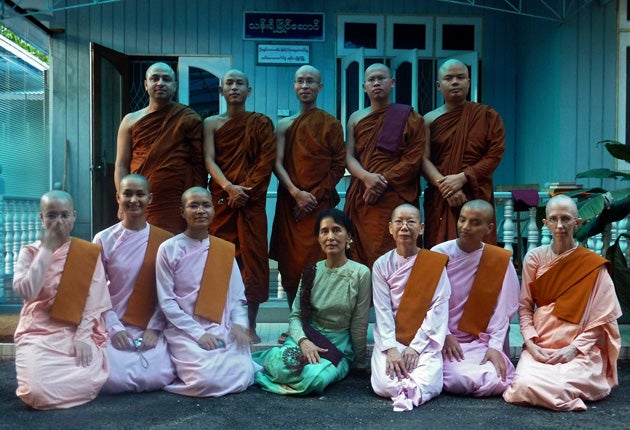Suu Kyi prepares route for peaceful revolution

Your support helps us to tell the story
From reproductive rights to climate change to Big Tech, The Independent is on the ground when the story is developing. Whether it's investigating the financials of Elon Musk's pro-Trump PAC or producing our latest documentary, 'The A Word', which shines a light on the American women fighting for reproductive rights, we know how important it is to parse out the facts from the messaging.
At such a critical moment in US history, we need reporters on the ground. Your donation allows us to keep sending journalists to speak to both sides of the story.
The Independent is trusted by Americans across the entire political spectrum. And unlike many other quality news outlets, we choose not to lock Americans out of our reporting and analysis with paywalls. We believe quality journalism should be available to everyone, paid for by those who can afford it.
Your support makes all the difference.First the euphoric, then the mundane. Having been at the centre of a thrilling, dizzying 36 hours of cheering crowds and flashing cameras, Burma's democracy icon yesterday had to get practical with issues such as the drains and rent.
While she had first spoken to diplomats and old colleagues, yesterday saw Aung San Suu Kyi meeting with the landlord of her National League for Democracy's (NLD) offices and turning to the maintenance of her crumbling home.
Both were issues that have been neglected during her seven years in detention. The slow, solitary days of her house arrest have been replaced with constant meetings at a frantic pace to meet the many demands placed upon her time since she was freed on Saturday. Her priority is to consult as widely as possible as she resumes her struggle to overturn nearly half a century of military rule through peaceful means.
"She has so much to do now – she is trying to fit it all in," said her close ally Win Tin. "First the landlord, then she is meeting with the party's central committee again and leaders of the NLD district offices who have come to Rangoon."
Ms Suu Kyi will no doubt have consulted her party colleagues about the issue of Western sanctions against Burma, having said she is anxious to study the issue to see whether they are hurting ordinary Burmese people more than the junta leaders and the business cronies it is intended they target.
Her word on the matter would heavily influence policymakers in Europe and the US who in the past have looked to Ms Suu Kyi for guidance on how to deal with Burma's military regime. Two weeks ago, the party made clear that it believed it was time to end its call for a tourist boycott of the country, a flashpoint of controversy among activists and campaigners.
Amid the weighty duties of the day, Ms Suu Kyi, 65, also made time to celebrate the wedding anniversary of her deputy U Tin Oo and his wife, look at her correspondence and even write some letters, by hand, to her closest friends and most loyal supporters, including Gordon Brown.
"She wanted to write to Mr Brown because he has been such a firm supporter of hers. She wants to show her appreciation," Win Tin said.
Mr Brown has spoken of his intense admiration for Ms Suu Kyi, written her letters and devoted a chapter of his 2007 book Courage to her, comparing the Nobel laureate's struggle against the Burmese junta with Nelson Mandela's fight to end apartheid in South Africa.
Win Tin, one of the founding members of the NLD, was arrested in 1989 and spent 19 years in Rangoon's Insein jail, most of them in solitary confinement, where he was beaten and tortured. He was reunited with his leader on Saturday for the first time since his arrest.
"I was happy to see she was the same Aung San Suu Kyi, active and alert and full of energy," he said. Ms Suu Kyi was arrested a few months after Win Tin and has spent 15 of the past 21 years in detention, most of them under house arrest. In the coming weeks, everything Ms Suu Kyi does and says will be closely watched for an indication of her tactics for dealing with the junta, headed by the senior general Than Shwe.
"I don't want to see the military falling. I want to see the military rising to dignified heights of professionalism and true patriotism," she told the BBC.
"I think it's quite obvious what the people want; the people just want better lives based on security and on freedom. I think we also have to try to make this thing happen. Velvet revolution sounds a little strange in the context of the military, but a non-violent revolution ... let's put it that way," she said.
"Every time that Suu Kyi has been released, she has tested the limits of her freedom, and one assumes she will continue to do so. As long as Than Shwe is around and has power it will be more difficult," said Professor David Steinberg, a long-time Burma watcher.
"She has no party but has personal charisma. This is obvious on the international stage, but we are not quite sure how far it extends internally."
He added: "We also must remember that the censorship laws are still in force, so what she says and does may not find its way into the local media."
Join our commenting forum
Join thought-provoking conversations, follow other Independent readers and see their replies
Comments